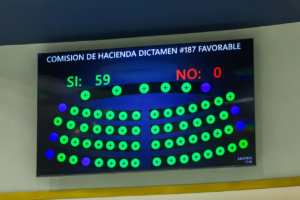The United States and China announced a 90-day suspension of most of the tariffs they had imposed on each other during their prolonged trade war. This decision, the result of two days of negotiations in Geneva, represents a clear sign of de-escalation and points to a possible path toward a more stable economic relationship between the world’s two largest economies.

During this truce period, it was established that chinese products imported into the United States will be subject to a 30% tariff, while US products entering the chinese market will pay a 10% tariff. This temporary 115-percentage-point reduction in tariffs seeks to facilitate greater trade flows and avoid a more serious economic rupture.
The impact of the announcement was immediate: the Hong Kong Stock Exchange rose more than 3% and the dollar strengthened against the yen and the euro. Analysts interpret this move as a positive sign for international markets, which have been following with concern the escalation of trade tensions between the two powers.

According to US Treasury Secretary Scott Bessent, the previously imposed tariffs acted as a “de facto embargo” severely impacting bilateral trade. Since the beginning of the year, cumulative US tariffs had reached 145%, with peaks of 245% on certain products, while China responded with tariffs of up to 125%.
Both sides agreed on the need to continue negotiations through a permanent dialogue mechanism. Chinese Vice Premier He Lifeng described the talks as “frank and in-depth”, while the Chinese government welcomed the “substantial progress” achieved, reaffirming that this pause benefits not only both countries but also the global economic balance.








